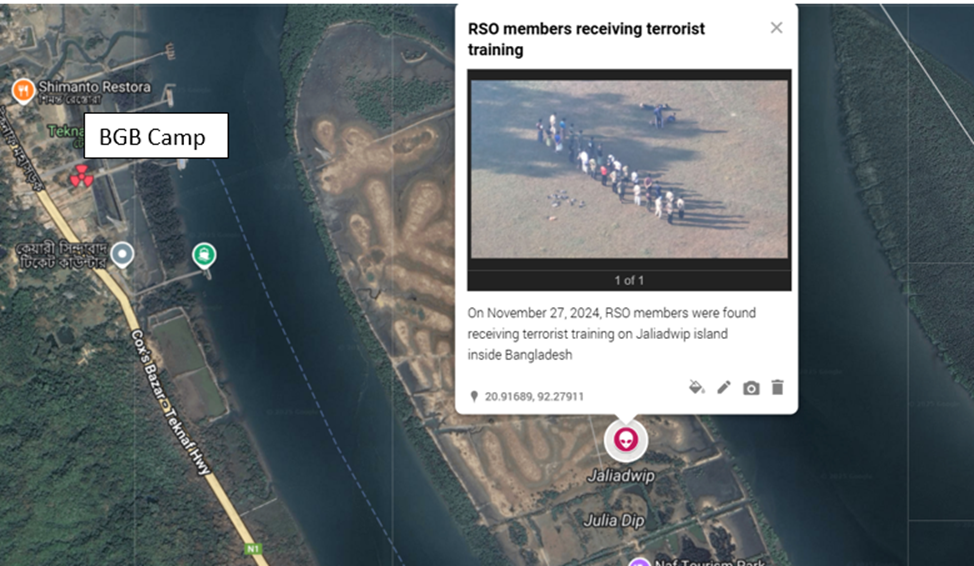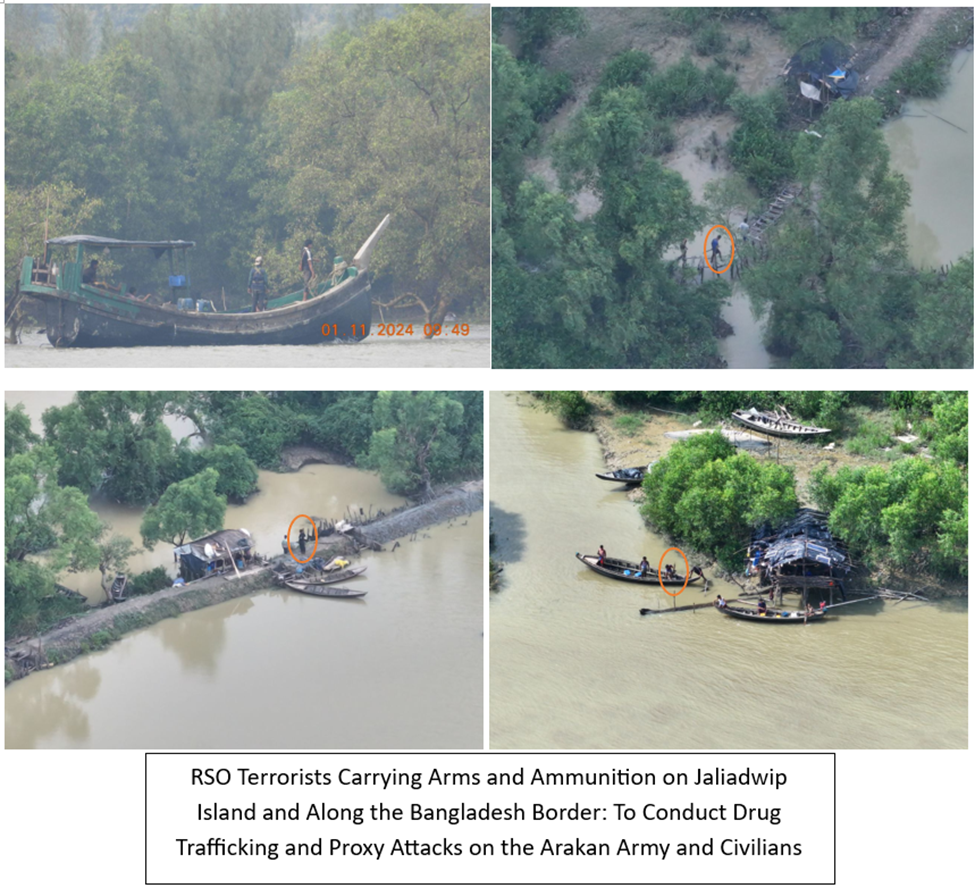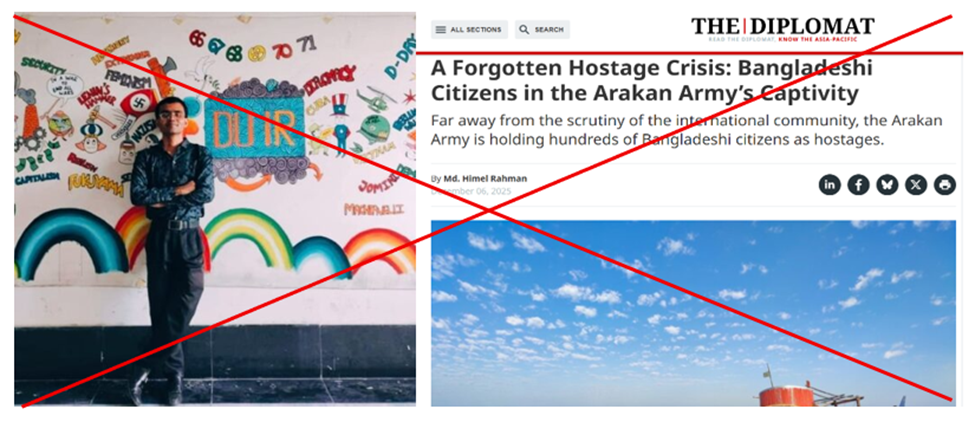Exposing Lies in the Border Guard Bangladesh’s Statement on the ULA/AA
- globalarakannetwork

- Sep 30, 2025
- 8 min read
Updated: Oct 10, 2025
News Analysis
Global Arakan Network September 30, 2025

On September 29, 2025, the Border Guard Bangladesh (BGB) issued a statement in response to the United League of Arakan/Arakan Army’s (ULA/AA) statement on September 27. The ULA’s statement was direct, straightforward, and supported by evidence and logical arguments. In contrast, the BGB’s rebuttal lacks concrete evidence and fails to provide reasonable grounds for its claims.
The Global Analysis Network (GAN), an analytical platform dedicated to providing clear and accurate information to the public, will examine the BGB’s statement point by point.
BGB’s Response to the Links with ARSA/RSO
Regarding the ULA’s claims of connections between the BGB and the terrorist groups Arakan Rohingya Salvation Army (ARSA) and Rohingya Solidarity Organisation (RSO), the BGB stated:
“These accusations are misleading, as the BGB has no connection with ARSA/RSO. On the contrary, the BGB has consistently taken firm steps to curb their alleged activities within Bangladesh. Several members have been arrested, including top leader Ataullah Jununi, demonstrating that the BGB treats ARSA/RSO as a threat to stability rather than an ally. The BGB has also taken strong measures to remove unauthorized armed personnel and eliminate their presence in border areas.”
The BGB provides only two points to support its claim of no connection with ARSA/RSO: the arrest of some group members and ARSA’s top leader, Ataullah Jununi. However, these points are insufficient to substantiate the BGB’s position. In fact, evidence suggests the opposite.
The arrest of ARSA’s leader appears to be a superficial act that, paradoxically, has bolstered support for these terrorist groups. Rather than dismantling them, the BGB’s actions seem to serve as a cover to mask deeper ties and more support with these organizations.
Involvement of BGB and DGFI
The BGB, along with certain extremist elements within the Directorate General of Forces Intelligence (DGFI), is allegedly a primary culprit in hosting, nurturing, and mobilizing the terrorist and militant activities of ARSA and RSO along the border. Abundant evidence supports this claim.
Observers associated with the GAN have noted that the BGB and DGFI have provided training and logistical support to these terrorist groups, using them as leverage to pressure the ULA leadership on the issue of repatriation. Photographic evidence included in the ULA’s recent statement further corroborates these allegations.

The above pictures are comprehensive, illustrating how the training camps of ARSA and RSO are located close to BGB posts and how these terrorist members conduct activities in collaboration with BGB officials. There have been several incidents in which ARSA terrorists attacked AA border patrollers from within Bangladesh and quickly escaped into BGB camps.


RSO Training Camps on Jaliadwip Island of Bangladesh and BGB Camps



Looking at the records, BGB and ARSA connections



The aforementioned photos and incidents represent only some of the evidence received by the Global Arakan Network (GAN). There are also several incidents in which the Border Guard Bangladesh (BGB) supported the terrorist activities of the Arakan Rohingya Salvation Army (ARSA) and Rohingya Solidarity Organisation (RSO) along the border, targeting the Arakan Army (AA).
Beyond the alleged BGB-terrorist nexus, the second points BGB’s statement included the following paragraph:
“Food shortages in nearby Buthidaung have worsened the situation, prompting Rohingya civilians to attempt crossing into Bangladesh. In one striking case, an AA lieutenant reportedly defected and surrendered inside Bangladesh—an indicator of the group’s weakening cohesion.”
The BGB’s statement correctly notes that food shortages in northern Arakan have forced many civilians, including Bangagya, to cross into Bangladesh. However, observers should question the root causes of the shortages of food, medicine, and basic humanitarian necessities, such as nutrition.
The clear and straightforward answer is the humanitarian and trade blockade imposed by the BGB, or more broadly, the government of Bangladesh. Since early 2025, the BGB has blocked humanitarian aid from the United Nations and international non-governmental organizations (INGOs), though the reasons for Dhaka’s decision remain unclear.
One possible motive could be to exacerbate the humanitarian crisis in northern Arakan, prompting more Bangagya Muslims to flee into Bangladesh. This allows the BGB to shift blame onto the ULA and request additional humanitarian assistance from the UN and international community.

The third allegations raised by the BGB concerns the alleged defection or surrender of an AA lieutenant. According to an official source from the AA, this individual was not a member of the AA but rather a BGB proxy operating within Bangladesh to conduct illicit activities, such as narcotic drug trafficking, on behalf of the BGB. Thus, this incident reveals the BGB’s readiness to fabricate claims to distort the truth for propaganda purposes. Government leaders in Dhaka should investigate the BGB’s deceptive and illicit activities along the border.
Quite surprisingly, the BGB’s claim of declining morale within the Arakan Army (AA)’s ranks and files is far from the ground reality. Instead, in several battlefronts in Myanmar, the AA is possibly the only group with no battle losses against the Myanmar junta. The reality is quite the opposite, with more youths voluntarily joining the AA from all communities to protect their homeland against both the Myanmar junta and BGB proxies, such as the Arakan Rohingya Salvation Army (ARSA) and Rohingya Solidarity Organisation (RSO).
Then, the fourth allegations in the BGB’s statement reads as follows:
“The Arakan Army’s abuses are not confined to the Rohingya population alone. Smaller ethnic minorities, such as the Mro and the Tanchangya, have also been subjected to persecution. Even members of the Rakhine community who refuse to pay extortion money to the AA face intimidation, violence, and harassment. Many among these groups, unable to endure the pressure, have fled across the frontier and taken shelter inside Bangladesh. Pictures of the aforementioned incidents appear below to substantiate these phenomena.”
Firstly, the AA has not committed abuses against any members of ethnic or religious communities. On the contrary, the ULA government has resettled many families from diverse ethnic communities fleeing Bangladesh into Arakan due to ethnic and religious persecution and suppression by BGB-linked terrorist groups, such as ARSA and RSO, in refugee camps within Bangladesh.
Two prominent examples illustrate this. On December 3, 2024, 57 Lin Kyae or Baung (လင်းကဲ့/ဘောင်) ethnic individuals sought refuge in Arakan due to ethnic and religious persecution by the BGB and the Bangladeshi military in the Chittagong Hill Tracts. These individuals came from two villages, Zartikaing and Darzarlin, in Bandarban district, bordering Arakan.
When asked about the reasons for their flight, they cited persecution and suppression by the BGB and Bangladesh Army, which left them no choice but to flee to Arakan for safety. These events serve as reminders of the ongoing ethnic cleansing targeting minority ethnic and religious groups in the Chittagong Hill Tracts (CHT).
Some of their photos are provided below.

The second example involves the Bangagya Muslims themselves. Although the Border Guard Bangladesh (BGB) has blocked the flow of humanitarian aid and trade along the border to harm civilians from all communities in Arakan and force people to flee into Bangladesh, many Bangagya families have been resettled by the Arakan government after returning from Bangladesh’s refugee camps due to security threats and extortion by BGB proxies, such as the ARSA) and RSO.
On August 26, 2025, 21 Muslims who returned from the hardships of the refugee camps in Bangladesh were successfully resettled in their homes following recommendations from the Maungdaw District Muslim Jury and approval by the district party committee.
A formal ceremony was held to reunite these 21 Muslims with their families. The authorities released them after ensuring compliance with legal procedures. Additionally, there are many other unreported cases of Muslims returning to Arakan due to the suppression and violence in the refugee camps.

Apart from those who fled into Bangladesh due to the socioeconomic challenges imposed by the Border Guard Bangladesh (BGB)’s blockade of trade and humanitarian aid, the above instances prove that there is a greater degree of stability and security in Arakan. Consequently, many Muslims have chosen to return voluntarily, and many ethnic minority people from Bangladesh have been forced to flee into Arakan.
The fifth amusing paragraph in the BGB’s statement reads as follows:
“The BGB has consistently acted against ARSA/RSO, dismantling its extortion networks and preventing drug smuggling across the Naf. Intelligence confirms that militants infiltrate from Myanmar, not from Bangladeshi soil. Moreover, landmines planted by the AA along the border make it implausible that ARSA operates freely from Bangladesh. The BGB has always upheld the interests of the country, focusing instead on humanitarian protection, narcotics interdiction, and border stability.”
However, there is clear evidence that extremist elements of the Directorate General of Forces Intelligence (DGFI) have manipulated and cultivated the terrorist coalition known as the so-called Four Brothers Alliance, including the Arakan Bangagya (Rohingya) Army (ARA) and Rohingya Islami Mahaz (RIM), beyond ARSA and RSO.

Dil Mohammed- Long-term informant and proxy of the Myanmar junta
Mv Abdu Mannan- Leader of RSO
Ramat Ullah, Mv Rahmat Karim – Leaders of ARSA
Ayub Nur- Leader of ARA
Hafez Soidul Amin- Leader of RIM???
In a May 20, 2025 article, independent analyst Shafiur Rahman revealed that, following the formation of the Four Brothers Alliance, Bangladeshi military intelligence issued a statement to the group:
“Stop the bloodletting in the camps, cease creating chaos that embarrasses us, and in return, you are free—for now—to position yourselves in Arakan.”
This statement indirectly suggests that if the group negotiates a non-violent resolution in the camps, Bangladeshi intelligence may support their efforts to instigate armed militant activities in Arakan.
Furthermore, multiple pieces of evidence indicate that Bangladeshi authorities facilitated the procurement of military uniforms and equipment from markets in Cox’s Bazar and Chittagong and provided logistical support to connect Burmese and Bangladeshi militant groups near their shared border.
Beyond the Border Guard Bangladesh (BGB)’s connections and sponsorship of proxy terrorist groups, the statement also referenced seemingly contradictory objectives such as “humanitarian protection” and “narcotics interdiction.”
In reality, these are tasks the BGB largely neglects. Regarding humanitarian protection, the primary cause of civilian and humanitarian suffering in northern Arakan and border communities stems from blockades imposed by the BGB and its affiliated terrorist networks, which prevent civilians from transporting essential humanitarian supplies to their families and loved ones.
For example, on August 18, 2025, ARSA terrorists extorted goods and basic humanitarian items from local Muslim civilians carrying food for their families near BGB camps. Such actions could only occur with the complicity of BGB officials, who deploy ARSA as a proxy for law enforcement along the border.

Recent photographs of the Border Guard Bangladesh (BGB) and the Rohingya Solidarity Organization (RSO) patrolling together along the Bangladesh border provide concrete evidence of the BGB’s collusion with extremist groups, as shown below.


In conclusion, the Border Guard Bangladesh (BGB)’s recent statement regarding the ULA/AA is merely a shameful attempt to conceal its errors and complicity in crimes perpetrated by Islamic terrorist groups such as ARSA and RSO.
Instead of providing factual and logical counterarguments to address the ULA’s claims—such as the existence of terrorist training camps near BGB outposts and the involvement of BGB officers in terrorist training and logistical support—the BGB’s statement ignores these issues.
It resorts to illogical responses, relying on distorted photographs and fabricated narratives. In short, all regional actors and international stakeholders committed to ensuring stability and security along the Arakan-Bangladesh border, as well as the sustainable and dignified repatriation of refugees from Bangladesh, should closely monitor the complicity and activities of senior BGB officers in terrorist and illicit activities.
Furthermore, government leaders in Dhaka must take decisive action to curb the dangerous ideas and actions of ground-level officers, irrespective of electoral politics in central Bangladesh.




_edited.png)


